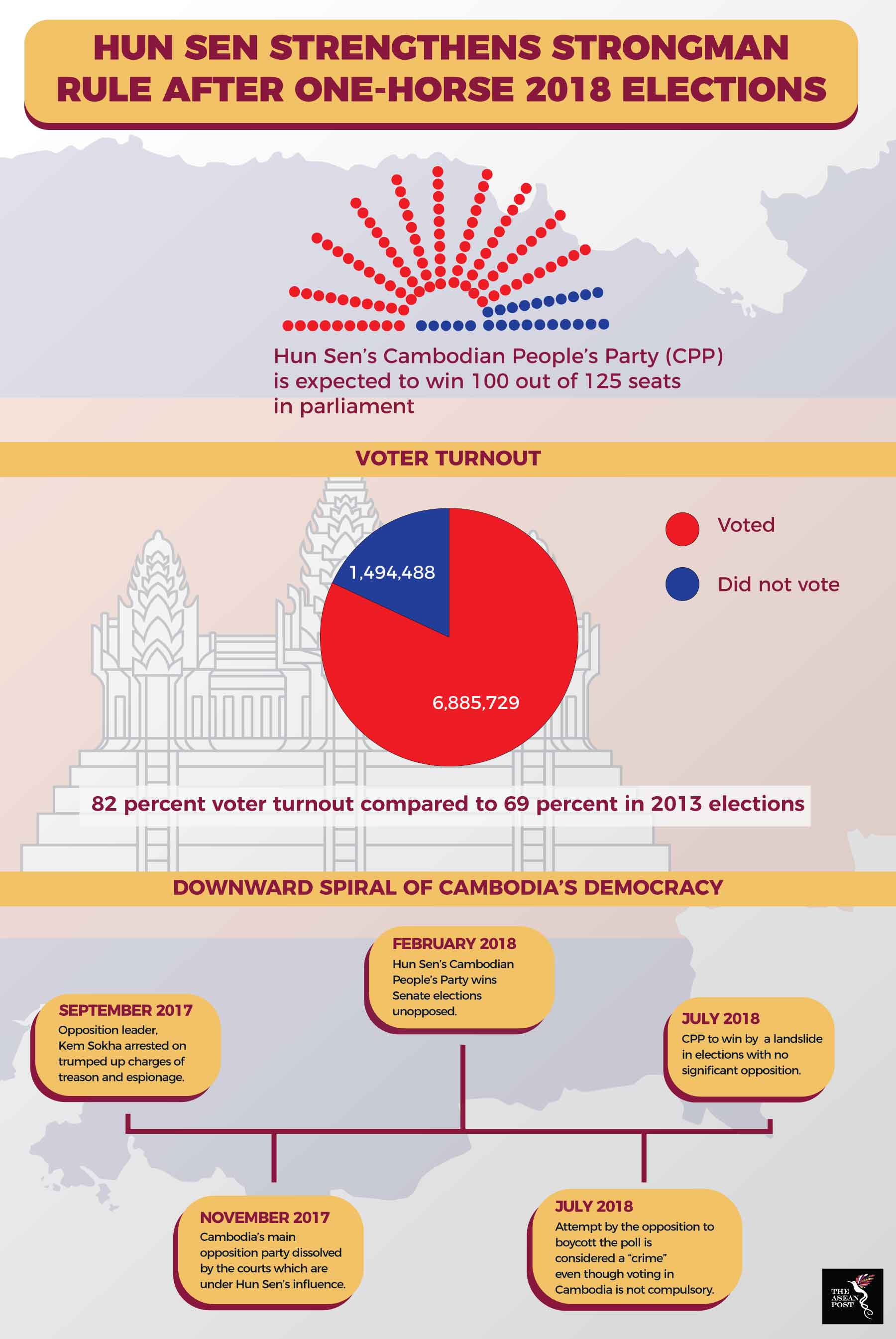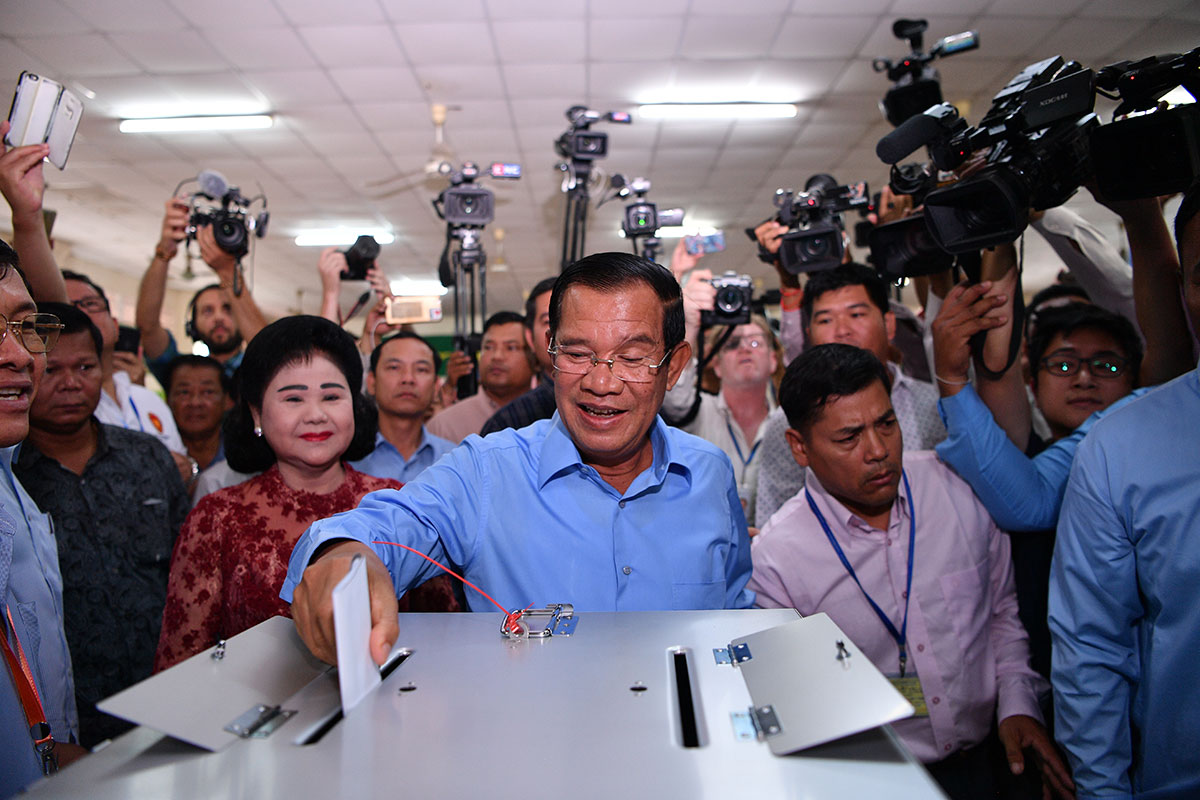Democracy is a four-letter word in Cambodia.
After 33 years in power, the country’s strongman leader, Hun Sen is set to prolong his rule when his party, the Cambodian People’s Party (CPP) announced its victory in a one-horse election.
CPP spokesperson Sok Eysan told Agence France Presse (AFP) late Sunday they expected to win “over 100 seats” in the 125-seat parliament, citing preliminary figures from the National Election Committee.
“The CPP will get more than 80 percent of the popular vote,” he said, adding that this was “a huge victory for us.”
Official results are expected on 15 August.
Hun Sen’s path towards re-election however, was paved with critics whom he had silenced in the run-up to the polls. The most pertinent blow to his defectors came with the dissolution of the Cambodian National Rescue Party (CNRP) by the country’s courts which have long operated under his control.
The CNRP was the only other credible contender for government having widened its support base and making significant inroads in local elections last year. It was led by Kem Sokha, whom himself was arrested under trumped up charges of treason last September. None of the other remaining 19 political parties in the country could muster enough political strength and capital to mount a serious challenge to the CPP’s longstanding rule.
CNRP leaders, in a last-ditch attempt, organised a “clean-finger” boycott in reference to the indelible ink applied on voters’ fingers after voting. However, encouraging eligible voters to skip the polls as a way to discredit the elections was viewed by the Cambodian government as a “crime” although voting is not compulsory in the country.
As if to prove a point, Cambodia’s election commission came out to announce after the polls had closed, that voter turnout was high at 82 percent. This surpassed the turnout of 69 percent in 2013 when the opposition took part.
"With one-party rule election turnout is generally higher, not lower, because the party, in this case the Cambodian People's Party, relies on voter intimidation more, relies on vote buying more, and turnout should be inflated that way," said Lee Morgenbesser from the School of Government and International Relations at Griffith University as quoted by AFP.
A disgraceful show
“It’s a disgrace, of course. It’s a pity. You had something beautiful for 25 years and you disfigured it,” said Sophal Ear, Associate Professor of Diplomacy & World Affairs at Occidental College, Los Angeles.
25 years ago, in 1993, Cambodia held its first democratic elections with the backing of the United Nations (UN). Hun Sen, who had been presiding over a tumultuous period of the country’s history more than a decade before emerged the victor in that election, and every election since.
“The aspirations of a people do not die when you march them into a voting booth and tell them to vote for you and they are forced to do so,” Ear continued. “Iran, Venezuela, North Korea and other communist countries do this; it doesn’t mean their governments are popularly elected under competitive conditions.”

Source: Various sources
Exiled opposition politician, Sam Rainsy, took to Twitter to express his thoughts on the elections.
“A victory without a contest is a hollow one. That’s the truth about the victory of Prime Minister Hun Sen in this Sunday’s elections, an easy victory as he had dissolved the only party that could have beaten him, the CNRP, in advance,” he said in the first of an 11-tweet thread.
The elections have also come under severe condemnation by the international community.
A joint statement endorsed by Asian Network for Free Elections (ANFREL) and several other electoral watchdogs in the region, denounced steps taken by the government to legitimise the elections accrediting large numbers of biased election monitors.
“The presence of untrained, so-called election observers is deplorable as it is highly prejudicial to the integrity of the polls,” the statement read.
“True democracy is not reflected merely on the number of observers, media, or political parties participating in political processes, but on the quality of engagement that each and every Cambodian enjoys.”
White House Press Secretary, Sarah Sanders said in a statement that the vote “failed to represent the will of the Cambodian people”.
“The flawed elections, which excluded the country’s principal opposition party, represents the most significant setback yet to the democratic system enshrined in Cambodia’s constitution,” said Sanders.
Additionally, she stated that the United States (US) is mulling the possibility of increasing visa sanctions from the ones announced late last year, among other steps that would likely be taken in response to setbacks in Cambodia’s democracy.
Canada's Foreign Ministry said in a statement that “the election campaign was widely recognized to have been marred by voter intimidation and manipulation of the polls.”
What now for Cambodia’s opposition?
There is very little that can be done to repair the damage to Cambodia’s democracy until and unless Hun Sen and the CPP are removed from power. For now, that remains a far-fetched dream.
Hun Sen has grown wary of his detractors and will likely make an opposition comeback nearly impossible. In the previous general elections of 2013 and last year’s local elections, he had a taste of dissent after a large youth voter bank angered by rampant corruption put his party’s longevity in power in doubt.
He has since been extending his executive power to the legislature and the judiciary. Under his regime, the three separate branches of government – the cornerstone of modern day democracy – have been corroded and are now wrapped tightly around his fingers, even more so in the past one year.
Nevertheless, one shouldn’t be too quick to dismiss the CNRP and its political will as comebacks in the political arena are not without precedence.
“The opposition needs to remember that the spirit of change is alive and well. It has been muzzled in 2018, but it is there, under the surface,” Ear remarked. “What’s next is to stay alive and to keep that flame going and to push the international community towards the kinds of policies that might put pressure on Phnom Penh to change course.”
“Today’s political prisoner or political exile may be tomorrow’s Prime Minister.”
